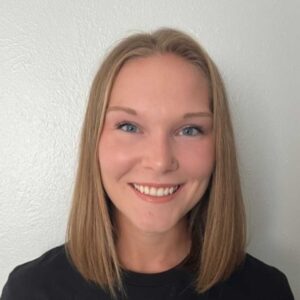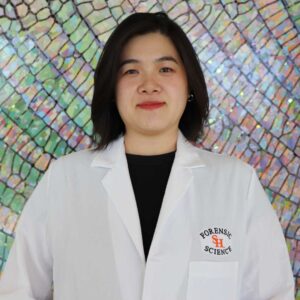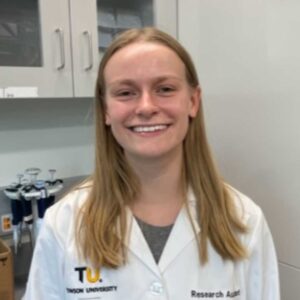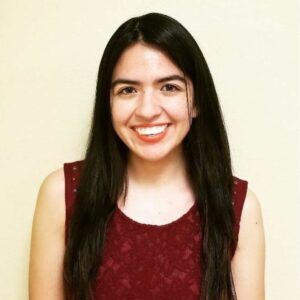We know that it takes a special kind of person to choose forensic science as a career, and this year, we’d like to recognize a few of the students who are making a difference in the field. We’re excited to introduce this year’s ISHI Ambassadors! These students are all pursuing degrees in the field of forensics. They will be participating in this year’s 34th International Symposium on Human Identification in Denver, Colorado. Follow Beighley, Julia, Cassie, and Kayli on social media as they share highlights from the ISHI workshops, presentations, and poster sessions. We’ll also hear about the fun moments in between the scientific sessions including the networking events. We look forward to seeing the meeting through their eyes, and learning more about their research and career aspirations.
Beighley Ayers – Masters in Forensic Science, Biology Track at Towson University
 My early fascination with forensic science started around middle school, inspired by television and documentaries broadcasting strong women in STEM using evidence as puzzle pieces to solve crimes. I knew forensic science was for me after taking an introductory course newly offered at my high school. I enjoyed taking on the tedious challenge of examining evidence and analyzing data to help evaluate the circumstance of the case. Even without an abundance of recognition, I found forensics to be self-fulling and a confidence-booster. Once I realized forensic science was offered in college and a pursuable career path, I entered my journey of becoming a forensic DNA analyst. As my first year of graduate school at Towson University comes to a close, I am one step closer to graduating with a Master of Science in Forensic Science in the biology track. With an in-depth education from Towson, I am eager to find a position as a forensic biologist working at a crime laboratory after graduating in May 2024.
My early fascination with forensic science started around middle school, inspired by television and documentaries broadcasting strong women in STEM using evidence as puzzle pieces to solve crimes. I knew forensic science was for me after taking an introductory course newly offered at my high school. I enjoyed taking on the tedious challenge of examining evidence and analyzing data to help evaluate the circumstance of the case. Even without an abundance of recognition, I found forensics to be self-fulling and a confidence-booster. Once I realized forensic science was offered in college and a pursuable career path, I entered my journey of becoming a forensic DNA analyst. As my first year of graduate school at Towson University comes to a close, I am one step closer to graduating with a Master of Science in Forensic Science in the biology track. With an in-depth education from Towson, I am eager to find a position as a forensic biologist working at a crime laboratory after graduating in May 2024.
Body fluids are important pieces of evidence that help determine the circumstance of a case. The identity of body fluids is an important step that is typically conducted via routine forensic serology testing. However, serology testing has drawbacks such as lack of confirmatory tests for saliva and vaginal fluid, and the excess sequential testing to evaluate numerous body fluids that leads to sample loss and degradation. An alternative way to distinguish body fluids from one another is through DNA methylation patterns and PCR-high resolution melt (HRM). Benefits of the PCR-HRM technique are in-tube methodology, being time efficient, analyzing differences based on a single nucleotide, and the ability to test of multiple body fluids in a single run. To process body fluids with this technique, samples are bisulfite treated to keep cytosines from being converted to uracil, and this methylation pattern is unique to tissues and cell type. By analyzing the melting curve, body fluids can be differentiated from each other individually and within mixtures. In my research, I will present data for the differentiation of body fluids, blood, semen, saliva, and vaginal fluid, using BCAS4-M and DDX4-U-L primers. Therefore, the goal of my research is to provide an alternative method to differentiate body fluids that will uphold the integrity of the sample, overcome routine serology drawbacks, and propose a method for laboratories to incorporate into everyday use.
Follow BEIGHLEY on INSTAGRAM and FACEBOOK or connect with her on LINKEDIN.
fun fact: i am really good at baking banana bread and muffins.
Julia Wang, PhD in Forensic Science, Sam Houston State University
 My curiosity for natural sciences first led me to study human biology and cell biology for my undergraduate and master’s degrees. My passion for research was nourished during this time by being able to pose my own research questions and watching scientists of various backgrounds push the boundaries of scientific discovery. After studying and working for a few years in animal and clinical research, I recognized that I wanted to pursue an applied science where the fruits of the labor could be seen within my lifetime.
My curiosity for natural sciences first led me to study human biology and cell biology for my undergraduate and master’s degrees. My passion for research was nourished during this time by being able to pose my own research questions and watching scientists of various backgrounds push the boundaries of scientific discovery. After studying and working for a few years in animal and clinical research, I recognized that I wanted to pursue an applied science where the fruits of the labor could be seen within my lifetime.
Without realizing it, I had crossed paths with forensic science multiple times in my life – as a child seeing the rise and fall of a local crime lab, as an undergraduate and graduate student studying cell biology, and now as an adult searching for a science in which to develop her career. Forensic science felt like a natural fit. Now I am proud to say that I research topics that I am passionate about while applying a curiosity for cell and molecular biology that has driven me for the majority of my life
My current research focuses on improving the analysis methods of sexual assault evidence. My post-graduation plans are to continue in bridging the space between state of the art research and crime labs especially in reducing the turnaround time in sexual assault evidence testing and reducing the sexual assault backlog. I want victims of sexual assault to be able to receive justice and closure as quickly as possible.
Follow Julia on INSTAGRAM and FACEBOOK Or connect with her on LINKEDIN.
fun fact: I was Grand Champion of the Fifth Annual World Chinese Youth Art Festival in Chinese Dance.
Cassandra Skrant – Forensic Science Program, Towson University
Multiple events in my life led me to forensic science. As a high school student I cultivated a passion for biology, which I decided to develop at The Ohio State University as a biology major. During my undergraduate years, I discovered that I have a particular interest in biochemistry, genetics, and microbiology. To explore this passion, I started undergraduate research with Dr. Alber. The research I conducted in her laboratory taught me so much, and I could not get enough. I felt comfortable in the lab and knew I wanted to stay there for the rest of my life. Although I was certain of my place in a laboratory, I was still questioning my place in the research world until I enrolled in a few forensic courses. During these courses I realized I loved forensic science and decided to continue my education at Towson University. All of these events led me to forensic science, but the main aspect that has kept me in forensic science, despite the realization that it is an exacting career with little recognition, is the idea that the work I am performing is helping provide relief to victims and loved ones. Since providing relief to victims and their loved ones is very important to me, my dream is to be a forensic DNA analyst who helps solve cases that do not receive as much attention as they should. This includes cold cases and backlogged sexual assault cases where the victims and families have not received the attention and justice they deserve.
Along with learning from others at the conference, I also plan on sharing my research project on discriminating monozygotic twins via pyrosequencing. This research project’s overall goal is to provide crime laboratories with a method for discriminating monozygotic twins because current STR typing methods are incapable of doing so. Pyrosequencing can be used to detect differences in DNA methylation between monozygotic twins. Before sequencing, each monozygotic twin sample will go through the typical beginning steps of STR typing workflow including extraction and quantitation. After quantitation, the samples are bisulfite treated so that the methylation can be detected with pyrosequencing and amplified. Then the prepared samples are placed on the PyroMark Q48 Autoprep where multiple CpG are sequenced, and the methylation levels are calculated. If the project is successful, it will provide a cost and time-efficient method for discriminating monozygotic twins in a crime laboratory. I cannot wait to present this research at ISHI in the fall and thank you for your consideration!
Follow Cassie on INSTAGRAM and FACEBOOK or connect with her on linkedin.
Fun fact: I actually have hated the taste of cake since I was a child, so I eat ice cream on my birthday instead.
Kayli Carrillo – Forensic Science Program, Sam Houston State University
The challenges found within the demanding career of forensic science provide the fuel necessary for me to excel in this field – as I possess an insatiable appetite to acquire knowledge. Professional and personal gratification is rewarding enough for a job well done. Forensic science serves as a non-biased entity within the criminal justice system, and while DNA evidence is not the sole contributing factor regarding a verdict to convict or exonerate, I am very excited to be able to combine science and justice.
My interest in forensic science began around eight years of age while in third grade. I discovered a keen interest in crime-solving television programs. CSI: Miami became my favorite never-miss show. My ever-consistent viewing partner (mom) and I found the intricate details and techniques applied to crime-solving fascinating. Consequently, my elementary and high school teachers quickly learned that I had a profound passion for forensic science.
My passion for forensic science only continued to grow as I progressed through my high school years; as a result, I conducted much research surrounding the steps necessary to pursue a career in forensic science. Learning about the complexities of DNA is what initially captivated me and sparked my interest in pursuing forensic biology.
Upon completing my doctoral studies, my initial step is to gain valuable exposure and experience within the crime lab environment at the local, state, or federal level. In time, I aspire to enter the realm of academic higher education in order to contribute towards further developing and advancing the minds of future forensic scientists. As I have been surrounded by great mentors, my ultimate desire is to be a mentor for the next generation of students.
My scientific area of focus involves research into low-template DNA (LT-DNA) or “touch” DNA. Advancements have been made to better process LT-DNA samples. At present, there is no standardized approach for processing LT-DNA samples. Consequently, I am investigating different methods with the aim of enhancing current techniques in the field. My research encompasses techniques ranging from sample collection to extraction, as well as downstream processes, with the ultimate goal of obtaining a greater amount of information from these samples. Furthermore, I am fascinated by the potential of enhancement techniques, such as whole genome amplification, to generate a DNA profile from only a few cells, which I find to be truly mind-boggling.
Follow Kayli on INSTAGRAM, FACEBOOK and TWITTER, or connect with her on LINKEDIN.
Fun fact: I love to dance salsa, cumbia, bachata, and even 50s music.
WOULD YOU LIKE TO SEE MORE ARTICLES LIKE THIS? SUBSCRIBE TO THE ISHI BLOG BELOW!
SUBSCRIBE NOW!




